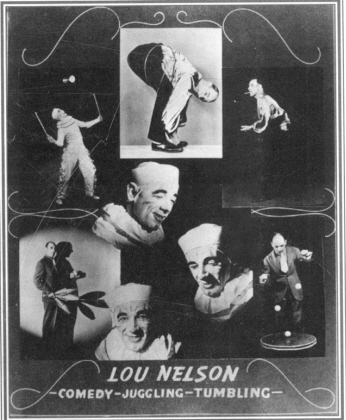 |
Page 40 Winter 1992 - 93
|
FLASHBACK By Kathy Veth
For
25 years Lou Nelson did what most jugglers only dream about. He earned
a living doing what he loved - performing.
Nelson
still juggles the three rubber balls he bought in 1932, but it's been
some time since he tried clubs. During an interview, he tried his Van
Wyck trio one more time. His first attempt failed. With a little
encouragement, though, he tried again and flashed three. On the third
try, he kept them spinning for nearly a full minute. A confident smile
widened as his skill returned. Nelson was born in Lowell, Mass. in
April 1905. Teddy Roosevelt was beginning his second term as President
of 45 United States. And Vaudeville actors were treated like kings and
queens.
One
summer the teenaged Nelson met a tumbler/juggler at the local YMCA.
Fascinated, he watched intently, trying to memorize what he saw. He
tried his best to imitate the performer, Nelson recalled, but the
unwilling mentor he had adopted told Nelson he would never succeed.
That didn't stop the talented youth. Nelson practiced his tumbles on
the soft sand at nearby Crystal Lake, ready to prove the acrobat
wrong.
Nelson
beat the odds. In the early 1930s he became a charter member of the
American Federation of Actors, which later became today's American
Guild of Variety Artists. AGVA's codes called for minimum
payment of $5 per show in the early years. The days of royal
treatment were over, apparently for good.
By
"dickering back and forth" with booking agents, (who took 10
percent), Nelson was able to make a living. In fact, he once had 22
straight weeks of work at theaters and nightclubs in his native
Lowell!
Nelson
considered himself lucky - not only to have a job he loved, but to
earn as much as $75 a week in such lean years. He knew he wouldn't go
broke. "Don't forget, money went far in those days," he
said.
.
In
the early 1930s, Nelson performed at night clubs and theaters up and
down the east coast. One entire summer late in the decade he was
featured on the "million-dollar" Steel Pier in Atlantic
City, N.J. He appeared often in Canada. He headlined at the Gaiety
Theater in Montreal, then continued up-country (so far up that wolves
would jump on the car when it stopped!), playing in Timmons, Ontario,
and then at Kirkland Lake (about 300 miles above Nonh Bay).
Throughout
the 1930s, Nelson and many other performers participated in the
government's Works Project Administration Federal Theater Troupe,
performing at state hospitals, jails, prisons and Conservation Corps
camps.
He
could dance tap and other popular steps of the day. When clowns were
needed, he cut silk into ragged pieces and sewed them onto his pants,
painted his face and donned a sailor hat. He bounce juggled five balls
with ease, although he admits he
never could master five in the air. Three balls were his specialty. He
did all the standard tricks of the day, including bouncing lacrosse
balls off of his inner arms.
The
used balsa-wood Van Wycks he purchased from a fellow juggler in 1935
were constantly in use. Shoulder throws, chops, slap-backs and more
were performed with ease to the delight of his audiences. In his spare
time, Nelson mended nicks and chips in his precious Van Wyck's with
fish glue and cheesecloth and re-covered them in the finest foil of
the day.
His
favorite, and perhaps most infamous trick, involved a cigarette and
matches. Nelson flipped the cigarette around his back and caught it in
his mouth. Next, he lit a match (Ohio Blue Tips or Bird's Eyes were
the best because they had long handles and a wellbalanced sulphur
end), flipped it around his back and caught the match in his mouth,
too.
He
would tease the audience, telling them
the trick was easy - he had a hole in his head between his ears!
"I just put a string through it and pull the match and cigarette
around," he joked.
By
the 1950s, audiences began .to realize they didn't have to go out to
be entertained - they could watch television right in their own
homes. In 1955, Nelson hung up his traveling shoes and bought an
auto body shop in Lowell. In 1977, at age 72, he closed the shop.
Today
Nelson has little time for retirement - or sleeping, for that matter.
He's too busy. He rises JUst before 3 a.m. After some pushups and deep
knee bends to keep himself in shape, he talks for ~ while on his
amateur radio. By 5:30 a.m. he's outside juggling.
His
secret to a long life? "Simple," he said. "Keep
juggling and keep breathing."
In
fact, he's looking for a gig. He plans to put an act together to take
it on the local nursing home circuit. He said he doesn't need the
money, he just wants to continue to make people happy.
|
 |